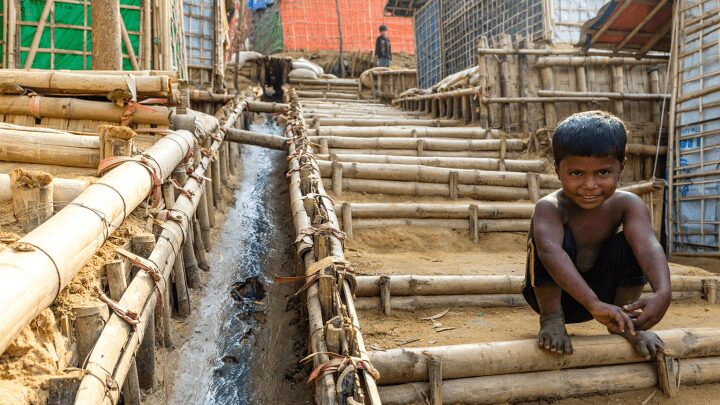

In his message for the 106th World Day of Migrants and Refugees, Pope Francis described the situation of displaced people as “an often unseen tragedy that the global crisis caused by the COVID-19 pandemic has only exacerbated.”
Choosing “Like Jesus Christ, forced to flee” as the day’s theme, the pontiff wrote, “the child Jesus experienced with his parents the tragic fate of the displaced and refugees….” He added, “Unfortunately, in our own times, millions of families can identify with this sad reality.”
Faced by nearly a million Rohingya refugees and many others, this sad reality is an ongoing concern for Development and Peace — Caritas Canada.
Destitution and dignity
The Rohingya exodus from Burma began in 2017. Their persecution by the Burmese armed forces, recognized by Canada as genocide, is the subject of a landmark case in the International Court of Justice.
Most of the fleeing Rohingya ended up in refugee camps in Bangladesh, facing acute shortages of food, shelter, education, healthcare and economic opportunity. Their impoverished Bangladeshi hosts share many of the same disadvantages.
From the outset, these communities have been served by Development and Peace’s partner, Caritas Bangladesh. The generosity of Canadians helps them bring hope and dignity to the refugees and their neighbours.
After rapidly addressing the refugees’ immediate shelter, food, water and hygiene needs, Caritas Bangladesh launched a sustained, participatory program to improve their housing, social and economic conditions. This effort is now supported by a $1-million grant from Global Affairs Canada.
An approach that works
As the head of program for Caritas Bangladesh’s Rohingya response, Abdullah Fuad oversaw a recent expansion of activities to two new camps. He reported, “Initially, people were unsure about what we were doing, and their cooperation was minimal. Now, they trust us. The most important thing is that wherever we work, we establish good relationships with the community.”
To build relationships, Caritas Bangladesh acts not as a provider, but as a partner. Of their shelter rehabilitation work, Fuad said, “We don’t impose design ideas on the community; we take their perspectives. We provide the materials they prefer, and train them to work as labourers. This gives them the opportunity for a little bit of earning. The people take ownership of their shelters and surroundings. It’s more sustainable that way.”
Ongoing and emerging challenges
Caritas Bangladesh encounters several challenges in its day-to-day work, especially since access to camps began being curtailed because of COVID-19. Aid workers are only allowed into the camps from 10 a.m. to 4 p.m. “After that,” Fuad said, “it is difficult to say what goes on. From time to time, we hear of refugees being robbed and attacked.”
Although refugees are supposed to be confined to the camps, some manage to venture out and mingle with the local population. Fuad said, “There are reports of some Rohingya engaging in theft and drug-dealing.” This fuels the suspicion and resentment that some in the host community have felt since the Rohingya began arriving in their midst.
“There are fears in the host community about what will happen when humanitarian support for the Rohingya is reduced,” Fuad said, admitting, “It’s a challenge to balance the needs of the host community and the Rohingya.” That is why Development and Peace is also funding training and micro-entrepreneurship solutions for the host community, focussing especially on women-led households, which are more vulnerable to economic insecurity.
The pandemic creates additional complications. “In the past month, there was a significant spike in COVID-19 cases in the camp. Now, humanitarian workers are also exposed to COVID-19 here. We hope there won’t be another lockdown in the area,” said Fuad.
While Caritas Bangladesh has implemented robust hygiene, distancing and public education measures, it is the economic impact of the pandemic that Fuad is most worried about. He said, “Years of development in this country have been wiped away with COVID-19. Huge numbers of businesses have gone. There is massive unemployment.”
Solutions from solidarity
Framing COVID-19 as a stimulant for solidarity, Pope Francis hoped, “We will be able to understand… that the precariousness that we have come to experience as a result of this pandemic is a constant in the lives of displaced people.” He recommended “international cooperation, global solidarity and local commitment, leaving no one excluded.”
From the frontline, Fuad put things more directly. “People are really suffering right now. So, if it is possible, please help! I would request donors to give more, so that we can do more for the poor people in this country, both Rohingyas and Bangladeshis.”

